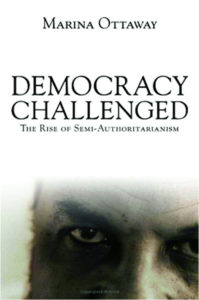
Democracy Challenged: The Rise of Semi-Authoritarianism
Marina Ottaway
Carnegie Endowment for International Peace (2003)
Rs2,891
During the 1990s, international democracy promotion efforts led to the establishment of numerous regimes that cannot be easily classified as either authoritarian or democratic. They display characteristics of each, in short they are semi-authoritarian regimes.These regimes pose a considerable challenge to U.S. policymakers because the superficial stability of many semi-authoritarian regimes usually masks severe problems that need to be solved lest they lead to a future crisis. Additionally, these regimes call into question some of the ideas about democratic transitions that underpin the democracy promotion strategies of the United States and other Western countries.Despite their growing importance, semi-authoritarian regimes have not received systematic attention. Marina Ottaway examines five countries (Egypt, Azerbaijan, Venezuela, Croatia, and Senegal) which highlight the distinctive features of semi-authoritarianism and the special challenge each poses to policymakers. She explains why the dominant approach to democracy promotion isnt effective in these countries and concludes by suggesting alternative policies.Marina Ottaway is senior associate and codirector of the Democracy and Rule of Law Project at the Carnegie Endowment.
Marina Ottaway teaches and researches at the Woodrow Wilson Center in Washington, D.C.. Her research interests include the politics of development, with particular reference to Africa, the Balkans, and the Middle East.
Before she joined the Wilson Center, she spent 14 years at the Carnegie Endowment, where she helped start up the Middle East Program. She has also taught at Georgetown University, the Johns Hopkins School for Advanced International Studies, the American University in Cairo, and three other universities, all in Africa.
Ottaway has a doctorate from Columbia University.
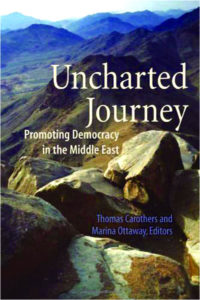
Uncharted Journey: Promoting Democracy in the Middle East
Thomas Carothers, Marina Ottaway
Carnegie Endowment for International Peace (2005)
Rs3,287
The United States faces no greater challenge today than successfully fulfilling its new ambition of helping bring about a democratic transformation of the Middle East. Uncharted Journey contributes a wealth of concise, illuminating insights on this subject, drawing on the contributors' deep knowledge of Arab politics and their substantial experience with democracy-building in other parts of the world. The essays in part one vividly dissect the state of Arab politics today, including an up-to-date examination of the political shock wave in the region produced by the invasion of Iraq. Part two and three set out a provocative exploration of the possible elements of a democracy promotion strategy for the region. The contributors identify potential false steps as well as a productive way forward, avoiding the twin shoals of either reflexive pessimism in the face of the daunting obstacles to Arab democratization or an unrealistic optimism that fails to take into account the region's political complexities. Contributors include Eva Bellin (Hunter College), Daniel Brumberg (Carnegie Endowment), Thomas Carothers (Carnegie Endowment), Michele Dunne (Georgetown University), Graham Fuller, Amy Hawthorne (Carnegie Endowment), Marina Ottaway (Carnegie Endowment), and Richard Youngs (Foreign Policy Centre).
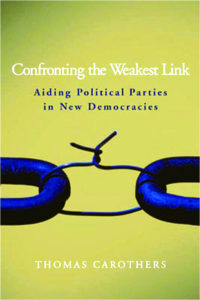
Confronting the Weakest Link: Aiding Political Parties in New Democracies
Thomas Carothers
Carnegie Endowment for International Peace (2006)
Rs3,023
Beset with persistent problems of self-interest, corruption, ideological incoherence, and narrow electoral majorities, political parties are the weakest link in many democratic transitions around the world. A large and ever-growing number of U.S., European, and multilateral assistance programs seek to help parties become effective pro-democratic actors. But given the depth of the problems, is success possible?C onfronting the Weakest Link is a pathbreaking study of international aid for political parties. Beginning with a penetrating analysis of party shortcomings in developing and postcommunist countries, Thomas Carothers draws on extensive field research to diagnose chronic deficiencies in party aid, assess its overall impact, and offer practical ideas for doing better. This critical analysis spans Latin America, Central and Eastern Europe, the former Soviet Union, Africa, the Middle East, and Asia. It sheds invaluable light on a major element of the contemporary challenge of democracy building, a subject now occupying center stage in the international policy arena.
Thomas Carothers is vice president for international politics and governance at the Carnegie Endowment for International Peace and founder and director of the Endowment's Democracy and Rule of Law Project.
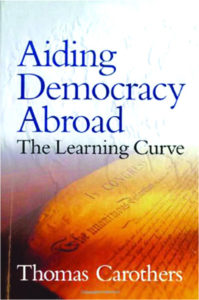
Aiding Democracy Abroad: The Learning Curve
Thomas Carothers
Carnegie Endowment for International Peace (1999)
Rs2,628
Aid to promote democracy abroad has emerged as a major growth industry in recent years. Not only the United States but many other Western countries, international institutions, and private foundations today use aid to support democratic transitions in Eastern Europe, the former Soviet Union, Asia, Africa, Latin America, and the Middle East. Though extensive in scope, these activities remain little understood outside the realm of specialists. Debates among policymakers over democracy promotion oscillate between unhelpful poles of extreme skepticism and unrealistic boosterism, while the vast majority of citizens in aid-providing countries have little awareness of the democracy-building efforts their governments sponsor.Aiding Democracy Abroad is the first independent, comprehensive assessment of this important new field. Drawing on extensive field research and years of hands-on experience, Thomas Carothers examines democracy-aid programs relating to elections, political parties, governmental reform, rule of law, civil society, independent media, labor unions, decentralization, and other elements of what he describes as "the democracy template" that policymakers and aid officials apply around the world.Steering a careful path between the inflated claims of aid advocates and the exaggerated criticisms of their opponents, Carothers takes a hard look at what such programs achieve and how they can be improved.
Thomas Carothers, an attorney in Washington, D.C., was recently an International Affairs Fellow of the Council on Foreign Relations. He is a contributor to Exporting Democracy: The United States and Latin America (1991).
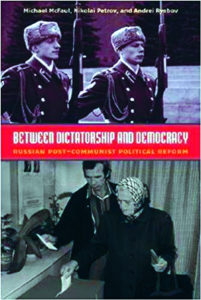
Between Dictatorship and Democracy: Russian Post-Communist Political Reform
Michael McFaul, Nikolay Petrov, Andrei Ryabov
Brookings Institution Press (2010)
Rs3,287
Many thought a decade ago that Russia had irreversibly crossed the boundary separating dictatorship from democracy. We now see discouraging evidence of an authoritarian revival that places Russia back in the gray zone between regimes. This collection of empirically rich and theoretically informed essays by Russian and American specialists shows why the backsliding has occurred, with what results, and with what implications for the future.
For hundreds of years, dictators have ruled Russia. Do they still? In the late 1980s, Soviet President Mikhail Gorbachev launched a series of political reforms that eventually allowed for competitive elections, the emergence of an independent press, the formation of political parties, and the sprouting of civil society. After the collapse of the Soviet Union in 1991, these proto-democratic institutions endured in an independent Russia. But did the processes unleashed by Gorbachev and continued under Russian President Boris Yeltsin lead eventually to liberal democracy in Russia? If not, what kind of political regime did take hold in post-Soviet Russia? And how has Vladimir Putin's rise to power influenced the course of democratic consolidation or the lack thereof? Between Dictatorship and Democracy seeks to give a comprehensive answer to these fundamental questions about the nature of Russian politics.
A thorough book on one of the most important questions facing Russia today. The future of Russia's democracy may be the last lingering question from the revolutionary process launched almost two decades ago. To understand why Russia's political transition has been so long and protracted, there is no better place to start.
Michael McFaul is a senior associate at the Carnegie Endowment, the Peter and Helen Bing senior fellow at the Hoover Institution, and an associate professor of political science at Stanford University. A prolific author, he is one of the world's leading specialists on democracy development in the former Soviet states. Nikolay Petrov is a scholar-in-residence and chairs the Carnegie Moscow Center's Society and Regions Program. He is also a senior research associate with the Institute of Geography at the Russian Academy of Sciences. Andrei Ryabov is co-chair of the Russian Domestic Politics and Political Institutions Program at the Carnegie Moscow Center.

